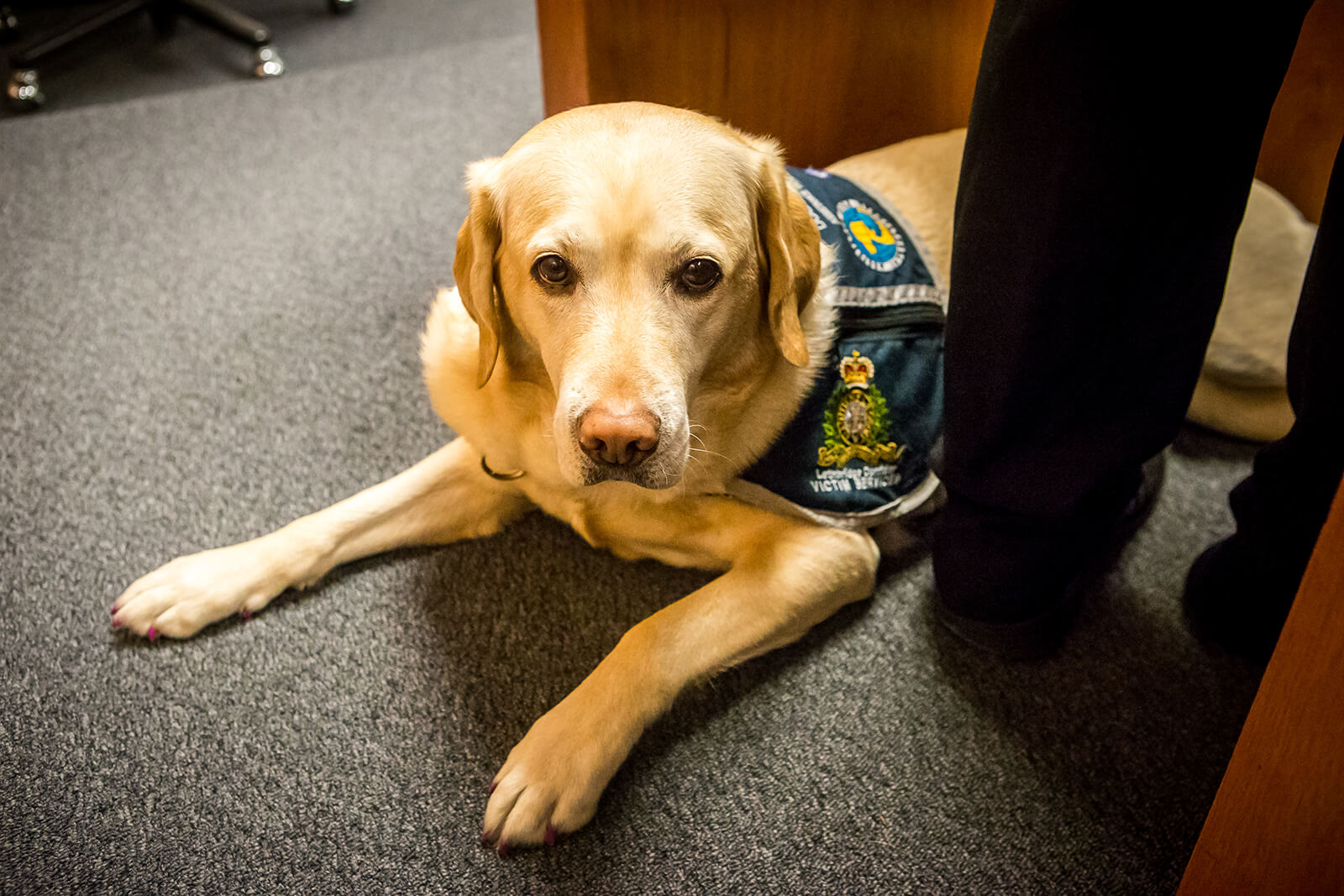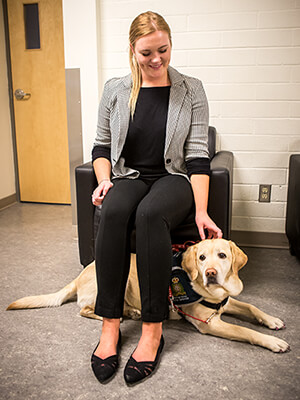From the back of the mock courtroom in AN1756, you can’t see the yellow Labrador retriever lying in the witness box. But if you’re in the box, she can’t be missed.
“I could feel her touch my ankles a couple of times,” says Raelene Austin, a second-year Criminal Justice student, who assumed the role of “Annie Hall,” witness to a break-and-enter and robbery that was the focus of this mock trial.
Under questioning by the defence team — led by retired police officer and Lethbridge College alumni Tony Andrews (Law Enforcement 1984) — and with instructor Murray Bartley serving as trial judge, Austin fidgeted occasionally on the stand. Each time she moved, she could feel the warmth of Madison, the Victim Services dog, against her legs.
“She’s nice to have,” Austin says. “It takes your focus off your anxiety.”

Every student has a role to play in this, one of three “trials” being heard this week as part of Bartley’s Courtroom Procedures course. Some, like Austin, are witnesses, victims, the accused or investigating officers facing examination and cross-examination. Others are prosecutors or defence lawyers. The rest are jurors.
Bartley, a former RCMP homicide investigator, says the three trials are based on real cases and offer a powerful formative assessment of learning.
“My students absolutely love it,” Bartley says. “It is the highest level of thinking — applying what they’ve learned in theory. It sets them up for success in the future.”
During the mock trial, students practise multiple skills including critical thinking, active listening, report writing, public speaking and team building.
Adding to the authenticity of the experience are the volunteers. Andrews, who spent nearly 30 years in policing before moving into threat assessment work, leads the defence team and mentors students through that process. Across the aisle, Kristi Adams, a Lethbridge Crown prosecutor, guides students on the art of examination, cross-examination and introduction of evidence. Adonus Arlett, program manager of Lethbridge Corridor Victim Services (RCMP), is Madison’s handler. She and the service dog committed three days on campus so students can experience how effective the dog can be in helping victims tell their stories.
In addition to sharing their experience and knowledge, the volunteers exemplify commitment to the community, Bartley says.
Arlett says she’s happy to expose a new generation of police officers to the benefits of the Victim Services dog. Madison not only serves in court, but also in police interviews, where men, women and children must share harrowing and traumatic experiences.

“It’s all chemical,” Arlett says, explaining Madison reacts to pheromones given off by people reacting to their circumstances. Arlett is keenly aware of Madison’s cues warning of rising anxiety in people who may not be able to express their discomfort for themselves. Picking up low levels, the Lab nudges or licks. She then escalates to purring or whining noises. At her most alarmed, Madison barks, a rare action she takes if earlier cues are ignored.
It’s a running joke that the dog groans when defence lawyers talk. It’s not an insult, but as the defence starts asking questions, the witness’s anxiety naturally starts to rise, Arlett says.
In this trial, Madison looks bored in the witness box. She’s accustomed to dealing with much higher levels of anxiety. But even in this controlled environment, she immediately perks up when Andrews begins picking apart a witness account.
Not only comforting to traumatized individuals, Madison can be a resource for police officers, reducing interview time by a quarter to a half, Arlett says.
“We help,” she says. “They can focus on investigation and we ensure victims’ needs are met.”
For second-year student Austin, the experience with Madison is another example of the real-world experience she’s gaining from her program.
“Our instructors walk you through their experiences,” she says. “I plan to go into a career filled with stress. Dogs like Madison “help relieve all of that and promote a healthy mind, not only for victims.”
Meet Madison, a canine human whisperer
 Madison, a five-year-old yellow Lab working with Adonus Arlett, program manager with the Lethbridge Corridor Victim Services (RCMP) program, is a remarkable dog for many reasons:
Madison, a five-year-old yellow Lab working with Adonus Arlett, program manager with the Lethbridge Corridor Victim Services (RCMP) program, is a remarkable dog for many reasons:
- She’s the first victim services dog in southern Alberta, and one of just a dozen in Alberta. She travels often to help with cases in other jurisdictions.
- Madison is a product of Dogs with Wings, an assistance dog training organization that trained her for 18 months.
- She’s a one-in-a-million service dog, her handler says, having produced 23 puppies that are also in service, two of them in southern Alberta. Once service dogs breed, they are typically retired from service, but Madison has a will to work and a stubborn temperament.
- She associates having her nails painted with working in a courtroom. If the witness she’s working with doesn’t want to paint her nails as a pre-court bonding ritual, her handler does it. It’s the dog’s version of a business suit.
- The stress of her work takes a toll as she takes in the emotional energy from people around her. To de-stress, she swims or runs and needs breaks. If the weather is foul, Madison and her toys take to a filled bathtub.
- She rarely barks, and if she does it’s out of frustration that no one has acted on her other cues indicated someone’s rising anxiety. On one occasion, the bark was followed by a witness fainting. In the other, she and her handler were in a shopping mall and the dog became increasingly agitated as she neared a woman pushing a stroller. Her handler asked to check on the baby inside the covered stroller, and found the child in distress, choking on a bottle.